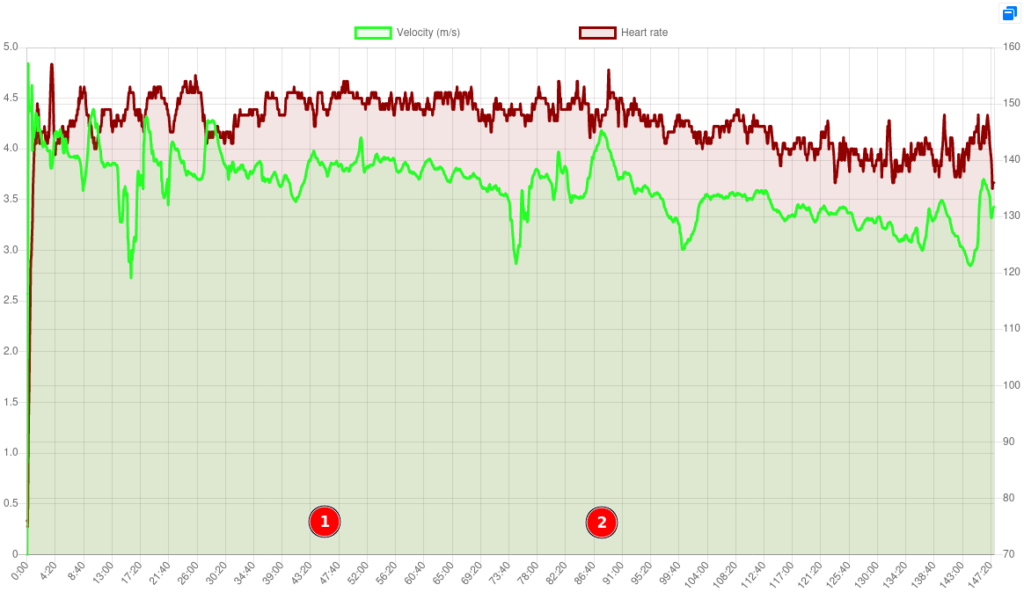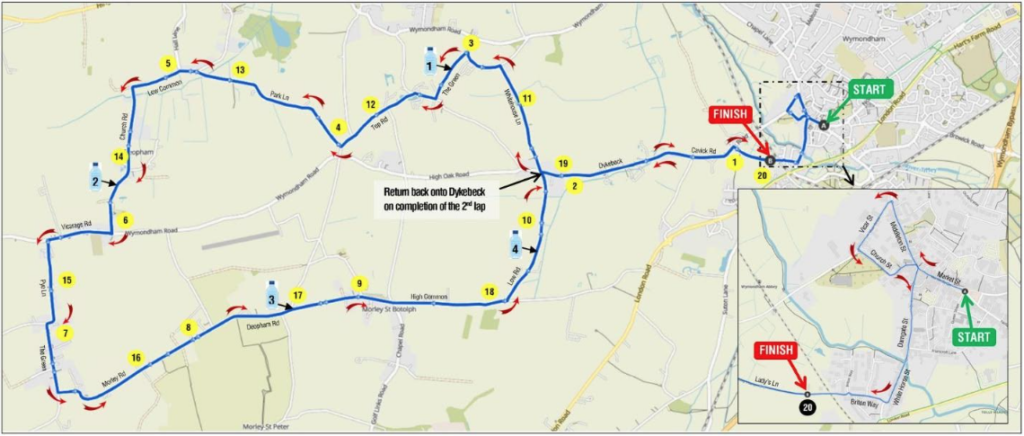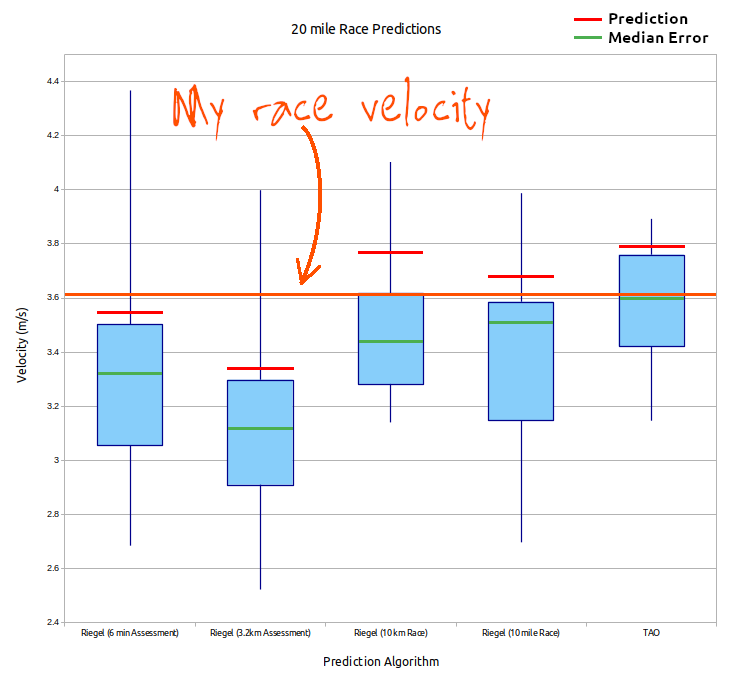Report of my Wymondham AC 20 Mile race. First race of the season that did not go to plan. Find out why.
Last Sunday (26th March 2023), I ran the Wymondham 20. As mentioned in my pre-race article, this is a 20 mile road race hosted by Wymondham Athletic Club around country lanes surrounding the village of Wymondham, Norfolk, in England.
The route could be described as typical for Norfolk, with relatively minor hills of at most 25 metres of climb. It is basically a two lap race, but with an ‘out-and-back’ to get to and from the start/finish and the main loop. The course map below should help to explain this better.
I do not know the village of Wymondham at all, and so made sure to set off in good time to be able to find parking and orientate myself. This was aided by a very helpful ‘where to park’ leaflet provided by the organisers. On parking up the heavens opened, and I remained in the car for as long as I could before venturing through the rain to the event HQ to collect my race number – I even managed to grab a 5 minute cat-nap. On walking the short distance to the town centre and the race start, the rain cleared, though the 6°C felt a fair bit colder due to the wind chill. As my arms and legs got colder and colder, I was willing on 9:30am for the race to begin.
We started 2 minutes later than scheduled, but once off we were off! It was a first downhill start! Whilst my plan (see pre-race article) was an average pace of 4:23 min/km, I am a fast downhill (and not so fast uphill) runner and always go with my subjective effort and the terrain.
Kilometre one was completed in a time of 4:11. A mixture of terrain and sanity brought things under control by the second with a near-perfect 4:22 min/km pace. This pattern continued in a near-boring fashion and I hit the 10 km marker a mere matter of seconds ahead of target. Time to take my first gel.
Whilst the next ten kilometres were uneventful, as I approached the 20 km marker on schedule, I could sense I was just starting to tire a little. So, as per my strategy of two gels (one at 10km and the other at 20 km, with a third in reserve for near the end, just in case), I reached into my belt for my next supplement. Horror, it was not there! I searched are re-searched, to no-avail.
My brain went into carbohydrate protection overdrive.
My brain went into carbohydrate protection overdrive* and even though I was going downhill I had no strength and my pace dropped. I tried to reason with my muscles that they still had glycogen to process and managed to pick up the pace again, but alas it was short-lived as by the 24 km marker I was faltering again. By 25 km it was game over, and I was struggling to keep faster than 5:00 min/km. The final uphill towards the finish was tough at a disheartening 5:18 min/km pace.
My official finishing time was 2:27:53, over 5 minutes slower than targetted.
Analysis

The chart above shows my velocity and heart rate throughout the race. The two markers indicate the gel ingestion points. The second one never happened, and the corresponding significant drop in pace and heart rate is clearly visible.
My usual calm pre-race routine was severely hampered!
Whilst the missing gel(s) was no doubt a major contributor in my drop in performance. I suspect (like is often the case) there were a multitude of contributing factors. A significant component being the night before the race. I had unforeseen personal circumstances crop up on Saturday afternoon that necessitated a lot of driving, rushing around, and a quick meal ‘on the hoof’. I did not get to bed until 1 am, only to find that the clocks were going forward for British Summer Time. Needless to say, my usual calm pre-race routine was severely hampered!
On looking now, my Garmin Body Battery was 75 on waking and already down to below 60 at the start of the race. Normally it is still above 80 at the start line, so whatever those numbers really mean, they do seem objective measures that I was not in my best condition for a top-performance race.
Unlike previous occasions, when comparing my race performance against the predictions, there is not an obvious clear winner. Though in fact, the Riegel (10 mile Race) was the nearest, predicting a time 1.5% faster than achieved.
| Algorithm | Predicted Pace | Predicted Time | Error (seconds) | Error (percent) |
| Riegel (3.2 km Assessment) | 4:59 | 2:40:34 | 761 | 8.6 % |
| TAO | 4:23 | 2:21:41 | -372 | -4.2 % |
| Riegel (10 km Race) | 4:25 | 2:22:18 | -335 | -3.8 % |
| Riegel (6 min Assessment) | 4:41 | 2:30:55 | 182 | 2.1 % |
| Riegel (10 mile Race) | 4:31 | 2:25:40 | -133 | -1.5% |
A most striking aspect of these predictions is that the interquartile ranges (the blue boxes in the box plots) for all the algorithms are lower than predicted values. This demonstrates that all algorithms are consistently over-optimistic on performance. This is understandable for the Riegel predictions due to how the algorithm was derived using only gifted runners.
However, it is not expected with TrainAsONE. Though again, it is interesting that my personal performance almost fitted perfectly with the median error. This begs the question, did my poor Saturday night preparation and loss of gels really have a significant effect on my performance? That we will never know.
Come on everyone, we need to run more 20 mile races!
This still leaves the unexplored topic of why TainAsONE has produced a picture of consistent over-performance predictions for 20 mile races. Whist there are probably lots of nuances to the answer, the simple one is that the TrainAsONE database contains no examples (until now!) of a runner matching my ability running a 20 mile road race. In fact there are less than a hundred 20 mile races with quality training blocks in the system. I knew 20 mile races are not that popular, but this seems mad. Come on everyone, we need to run more 20 miler races!
I still have more I could talk about, but think that is enough for now, and those ideas can wait for a separate later article.
A big thank you to all the race organisers, marshals and volunteers. I’m feeling I need another crack at this one next year!
Happy training, everyone.
* The brain pre-empts carbohydrate depletion by central reduction in muscle output to assist in prolonging carbohydrate availability.




